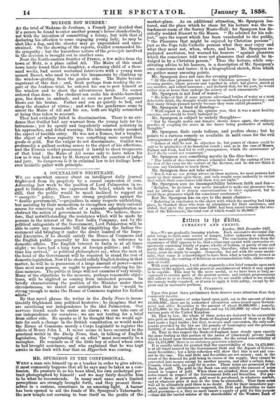A JOURNALIST'S NIGHTMARE.
WE are somewhat uneasy about an intelligent daily journal frightened from its propriety by a casual expression of ours. Adverting last week to the position of Lord Palmerston in re- gard to Indian affairs, we expressed the belief, which we hold still, that the public would be much inclined to support an " energetic " policy. There are strong prejudices against the "double government,"—prejudices in many respects unthinking, but assisting by their momentum to strengthen any truly rational course for removing such relics of a separate administration as obstruct the action of goveernment in India. We believe, there- fore, that notvrithstandinthe resistance which will be made by persons in the interest of the East India Company, and by the political antagonists of the Government, Lord Palmerston will be able to carry any reasonable bill for simplifying the Indian Go- vernment and bringing it under the direct control of the Impe- rial Executive, if he should satisfy the House of Commons and the English public generally by his measures in reference to domestic affairs. The English interest in India is at all times slight ; we have had a long turn at foreign politics ; and "the time has arrived," as political philosophers say, when the man at the head of the Government will be required to stand the test of domestic legislation. Now if he should satisfy English feeling in that matter, he will be in possession of a large amount of power—more than most men possess, or ought to possess—for carrying his In- dian measure. The public at large will not examine it very nicely. Many of the objections to the measure, perhaps reasonable objec- tions, will be slighted as coming from interested persons. In briefly characterizing the position of the Minister under these circumstances, we stated our anticipation that he "would be strong enough to make the House of Commons register his Indian edicts."
By that novel phrase the writer in the Daily News is incon- tinently frightened into political hysterics ; he imagines that we are sacrificing our independence to the idol Palmerston. Our nervous friend needs be under no alarm; we can take care of our independence for ourselves; we are not touting for a brief from either side. He speaks as if he thought that we would agi- tate for such a change in the British constitution as would make the House of Commons merely a Corps Legislatif to register the edicts of Henry John I. It never seems to have occurred to the practical writer in the Daily News, that, in talking of English legislation, the "registering of an edict" must necessarily be a metaphor. He reminds us of the little boy at school whose cries in bed brought assistance, and who explained that he was kept awake in the dark with fear that an Hyperbole was coming.


































 Previous page
Previous page